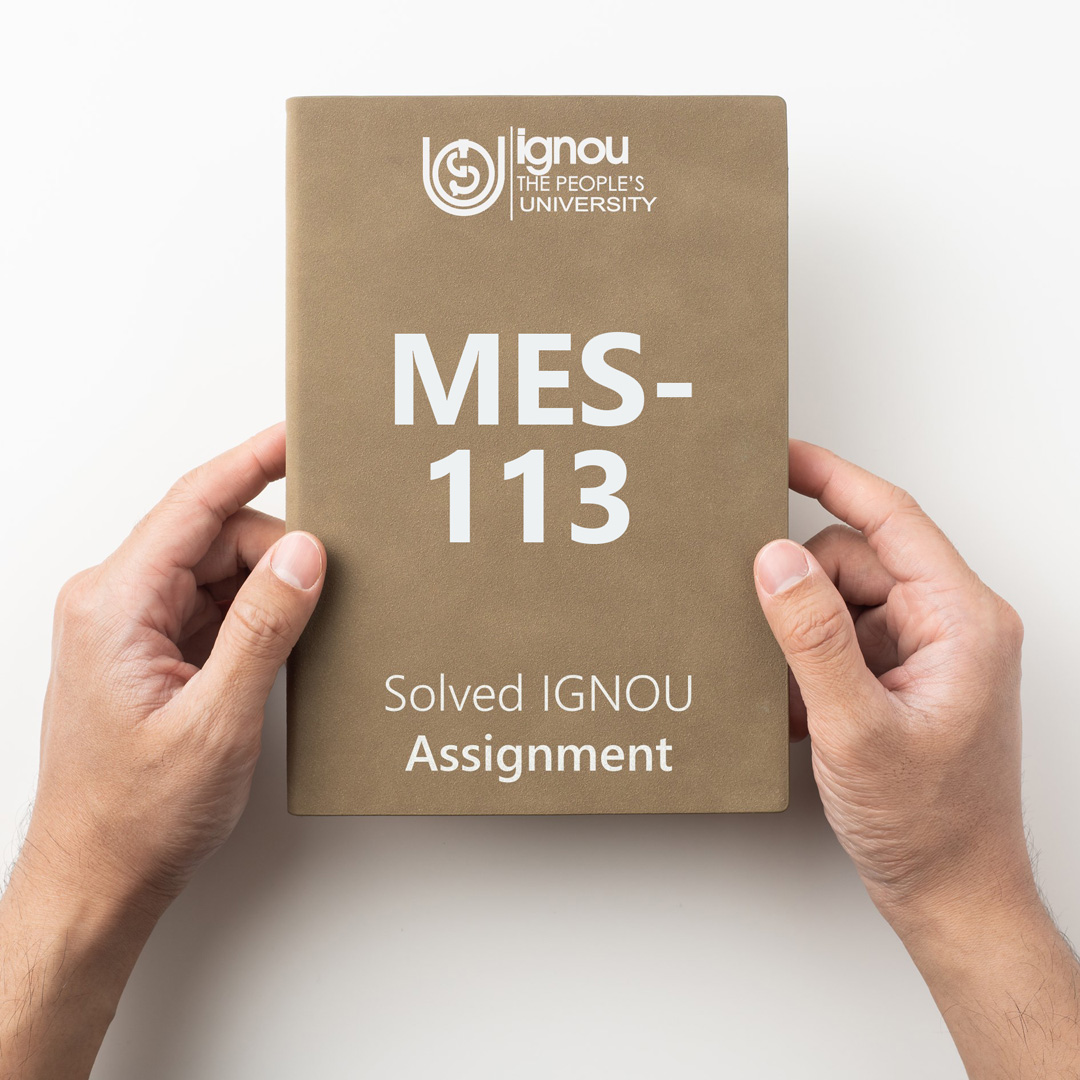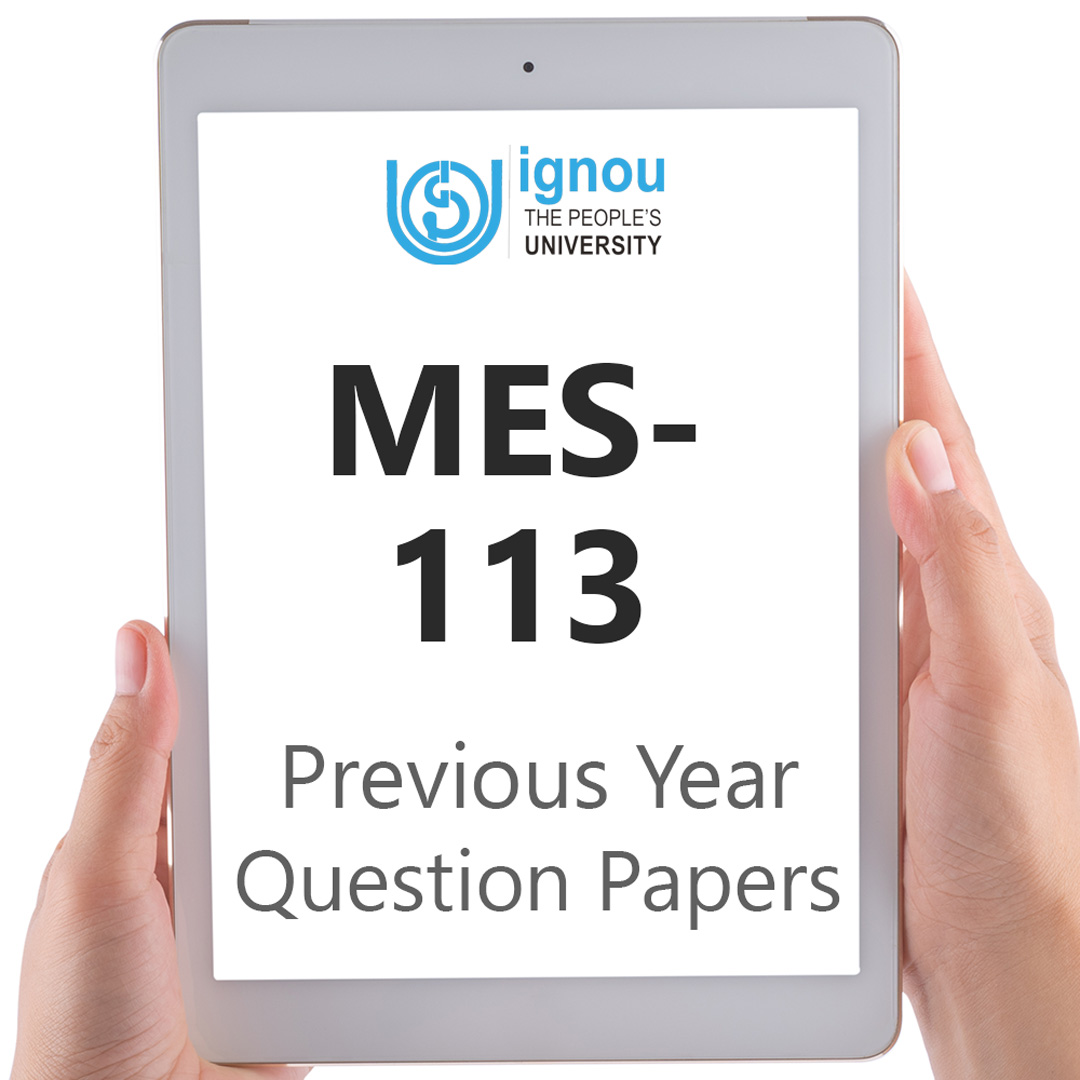If you are looking for MES-113 IGNOU Solved Assignment solution for the subject Learner Support Services, you have come to the right place. MES-113 solution on this page applies to 2023 session students studying in MAEDU courses of IGNOU.
MES-113 Solved Assignment Solution by Gyaniversity
Assignment Code: MES-113/TMA/2023
Course Code: MES-113
Assignment Name: Learner Support Services
Year: 2023
Verification Status: Verified by Professor
a) Explain the nature of support services required for the learners at the pre, during and post course stages in distance education system. (500 words)
Ans) Distance education is a flexible mode of learning that enables learners to pursue education at their own pace and convenience. However, learners in distance education programs often require various types of support services to enhance their learning experience and achieve their educational goals.
Pre-Course Support Services
Pre-course support services are crucial in helping learners prepare for their distance education program. These services include counselling and guidance, academic planning, and orientation to the distance education system. Counselling and guidance services help learners understand the requirements of the program and identify their learning needs and goals. Academic planning helps learners develop a course schedule and plan their study time effectively. Orientation to the distance education system helps learners understand the technology and resources required for the program.
During-Course Support Services
During-course support services are essential in helping learners succeed in their distance education program. These services include technical support, academic support, and communication with instructors and peers. Technical support helps learners overcome any technical issues they may encounter while using the distance education system. Academic support includes tutoring, writing assistance, and library services, among others. Communication with instructors and peers is vital in providing feedback and clarifying course content and assignments.
Post-Course Support Services
Post-course support services help learners transition from their distance education program to their next academic or career step. These services include career counselling, job placement assistance, and alumni services. Career counselling helps learners identify their career goals and develop a career plan. Job placement assistance helps learners find employment in their field of study. Alumni services provide ongoing support and networking opportunities for graduates. In addition to the above-mentioned services, learners in distance education programs may require additional support services based on their individual needs. For example, learners with disabilities may require accessibility services, while international students may require language support services.
There is also a lack of face-to-face interaction between students and teachers, which makes it difficult to provide support services to students who are enrolled in distance education programmes. However, with to advancements in technology, it is now possible to offer distance learners a variety of different support services. For instance, academic support can be made available through online tutoring, online writing centres, and online library resources. The use of email, video conferencing, and online discussion forums all make it easier to communicate with both your instructors and your fellow students.
In conclusion, support services are essential in enhancing the learning experience and success of learners in distance education programs. Pre-course support services help learners prepare for their program, during-course support services help learners succeed in their program, and post-course support services help learners transition to their next academic or career step. The provision of support services in distance education programs requires an initiative-taking approach and the use of technology to overcome the lack of face-to-face interaction between learners and instructors.
b) Describe the nature of developmental and problem-solving counselling practiced in distance education system. Highlight the personal, study and time related barriers faced in counselling in the distance education system. (500 words)
Ans) Distance education is a flexible mode of learning that enables learners to pursue education at their own pace and convenience. However, learners in distance education programs may face various personal, study, and time-related barriers that affect their learning experience. Developmental and problem-solving counselling are two types of counselling practiced in distance education systems to help learners overcome these barriers and succeed in their program.
Nature of Developmental Counselling
Developmental counselling focuses on personal growth and development. This type of counselling is designed to help learners identify their strengths, weaknesses, interests, and goals. Developmental counselling also helps learners develop self-awareness, self-esteem, and positive attitudes towards learning. In distance education, developmental counselling can be provided through online resources, videos, and virtual counselling sessions.
Nature of Problem-Solving Counselling
Problem-solving counselling focuses on identifying and addressing specific problems that learners may face. This type of counselling is designed to help learners overcome personal, study, and time-related barriers that affect their learning experience. Problem-solving counselling involves identifying the problem, developing a plan of action, and implementing the plan. In distance education, problem-solving counselling can be provided through online resources, email, and virtual counselling sessions.
Personal Barriers: Barriers that learners face in their personal lives and in their overall well-being are referred to as "personal barriers." These obstacles include of things like stress, anxiety, depression, and other disorders related to mental health. Learners may experience decreased motivation, concentration, and participation in their programme as a result of personal hurdles. Counselling that focuses on problem-solving and developmental growth can assist students in recognising and overcoming the personal obstacles that stand in their way.
Study Barriers: Learners' academic performance and progress in a programme can be negatively impacted by a variety of issues, including those referred to as study barriers. Inadequate study abilities, problems with time management, and challenges with the subject matter of the class all contribute to these hurdles. The learner's confidence and academic performance may suffer as a result of obstacles to their studies. Learners can benefit from the development of effective study skills and methods, improved time management, and assistance with addressing challenges posed by the curriculum by engaging in counselling that focuses on problem-solving and developmental issues.
Time-Related Barriers: Time-related barriers refer to the factors that affect learners' ability to balance their studies with other personal and professional responsibilities. These barriers include work commitments, family obligations, and other time constraints. Time-related barriers can affect learners' ability to stay on track with their studies and complete their program within the expected timeframe. Developmental and problem-solving counselling can help learners develop time management strategies and prioritize their responsibilities.
Counselling that focuses on developmental growth as well as problem-solving is an essential component of the support services offered by distance education programmes. Learners' ability to succeed in their programme may be impacted by personal, academic, and time-related obstacles. Learners can benefit from both developmental therapy and problem-solving counselling, since the former can help them determine their particular strengths and goals, while the latter can assist them in overcoming specific obstacles and hurdles. However, because there is no face-to-face connection involved, it might be difficult to provide counselling services to students who are enrolled in distance education programmes. As a result, educational establishments that offer distance learning have an obligation to their students to make use of technology and various other resources in order to deliver useful counselling services.
c) Critically analyse different types of tutor comments used in distance education system with suitable examples. (500 words)
Ans) Tutor comments play a crucial role in the success of learners in distance education systems. These comments provide learners with feedback on their performance and help them identify areas where they need improvement. There are different types of tutor comments used in distance education systems, each serving a different purpose and helping learners in different ways.
Corrective Feedback
Corrective feedback is used to highlight errors in learners' work and suggest ways to correct them. This type of feedback is essential in distance education systems as it helps learners identify their mistakes and improve their performance. Corrective feedback can be provided in various forms, such as written comments, audio feedback, or video feedback. For example, a tutor may provide written comments on a learner's essay, highlighting errors in grammar, syntax, or punctuation and suggesting ways to correct them.
Motivational Feedback
Motivational feedback is used to encourage and motivate learners to continue their learning and pursue their goals. This type of feedback acknowledges learners' efforts and achievements and provides them with positive reinforcement. Motivational feedback can be provided in various forms, such as written comments, audio feedback, or video feedback. For example, a tutor may provide written comments on a learner's assignment, praising their efforts and highlighting the strengths of their work.
Formative Feedback
Formative feedback is used to guide learners' learning and help them improve their performance. This type of feedback provides learners with specific and actionable advice on how to improve their work. Formative feedback can be provided in various forms, such as written comments, audio feedback, or video feedback. For example, a tutor may provide written comments on a learner's essay, highlighting the strengths and weaknesses of their work and providing specific advice on how to improve it.
Summative Feedback
Summative feedback is used to evaluate learners' overall performance in a course or program. This type of feedback provides learners with a final assessment of their work and their progress towards achieving their goals. Summative feedback can be provided in various forms, such as written comments, audio feedback, or video feedback. For example, a tutor may provide written comments on a learner's final project, summarizing their achievements and identifying areas for improvement.
Diagnostic Feedback
Diagnostic feedback is used to identify learners' strengths and weaknesses and provide them with specific advice on how to improve their performance. This type of feedback is particularly useful in the early stages of a course or program when learners are still developing their skills and knowledge. Diagnostic feedback can be provided in various forms, such as written comments, audio feedback, or video feedback. For example, a tutor may provide written comments on a learner's diagnostic test, highlighting their strengths and weaknesses and providing specific advice on how to improve their performance.
In conclusion, tutor comments are an essential part of distance education systems. They provide learners with feedback on their performance and help them identify areas where they need improvement. Different types of tutor comments are used in distance education systems, each serving a different purpose and helping learners in different ways. Corrective, motivational, formative, summative, and diagnostic feedback are all important types of tutor comments used in distance education systems. It is crucial for tutors to use a variety of feedback types to support learners' learning and help them achieve their goals.






